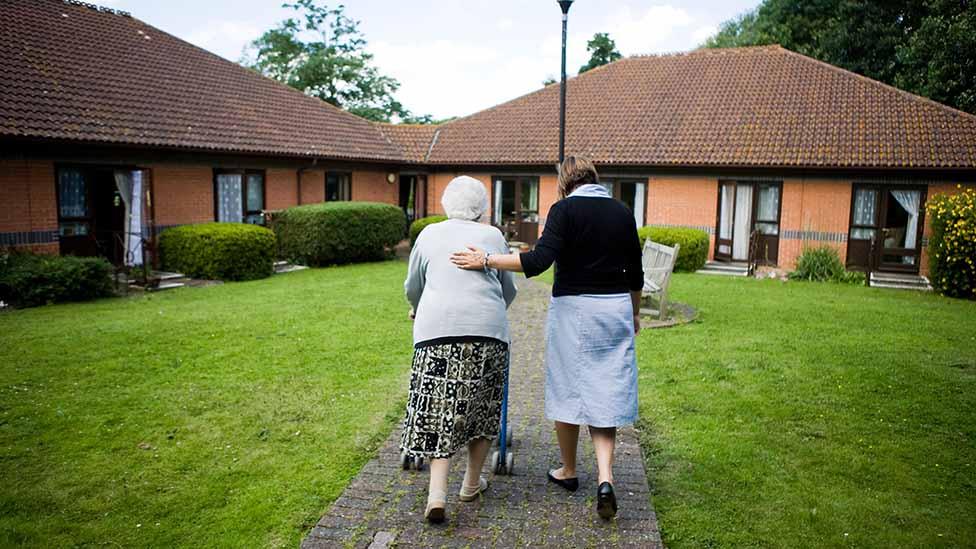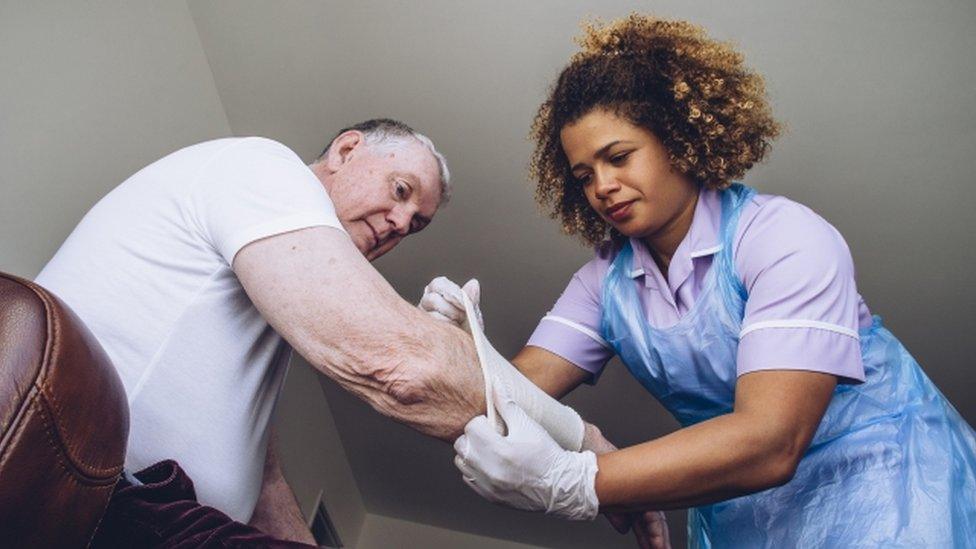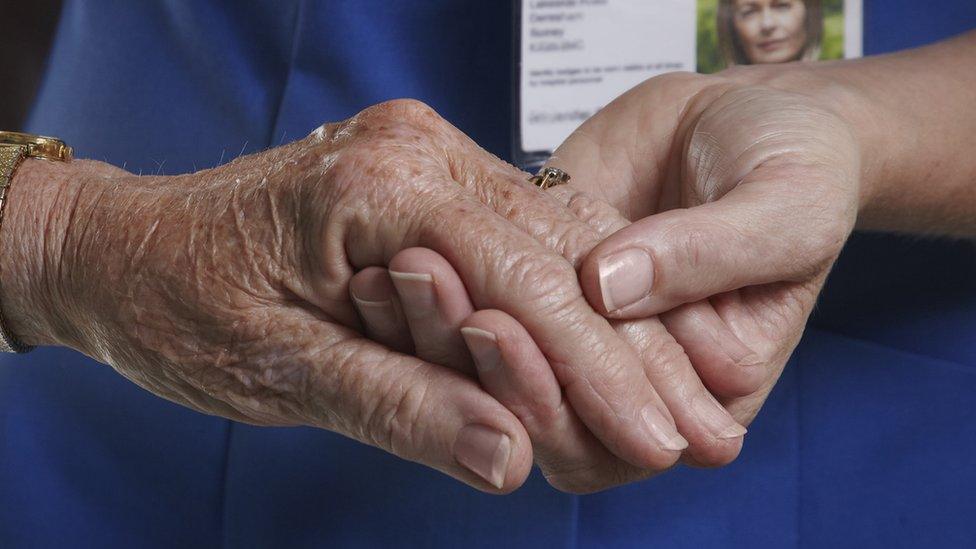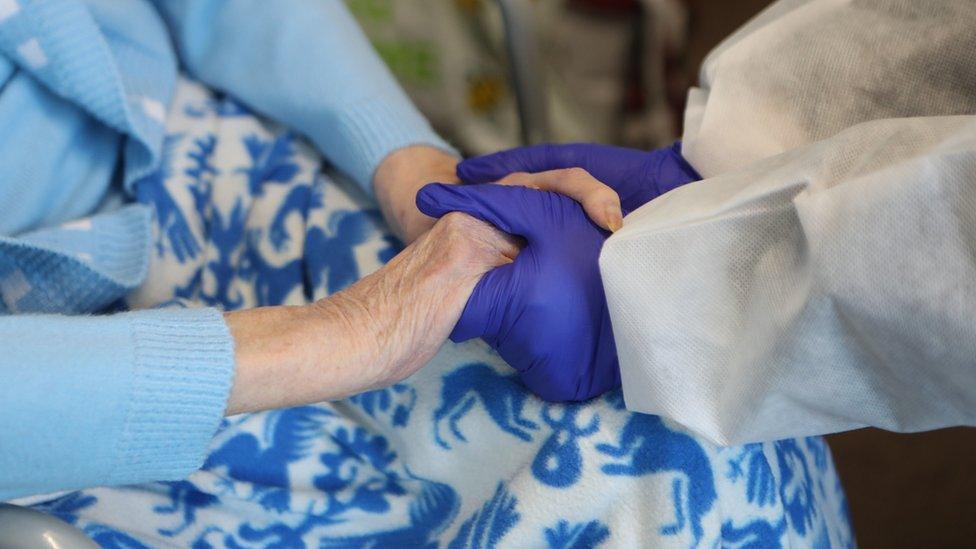Social care: What is it and how does it work in Wales?
- Published

Care at home or in a residential setting is means-tested in Wales
Prime Minister Boris Johnson has announced plans for an overhaul of funding for the social care system, which includes raising National Insurance (NI) payments.
Social care is managed by each of the home nations separately, but NI is paid throughout the United Kingdom into the Treasury at Westminster. So a rise affects everyone who pays contributions.
How will this affect people in Wales?
What is social care?
Social care refers to caring services - help with personal services like washing and dressing, and taking medication - for elderly or disabled people.
This can be carried out in their homes, if they are still able to live independently, with carers coming in to help them as often as their assessed level of need.
If they cannot live independently, people can be looked after in a care home, where they will have to pay for food and accommodation as well as care services.
Costs can vary depending on the level of need - nursing care costs more than looking after a person who just needs help with dressing, and people with dementia can need higher levels of intervention, for example.
How is care in Wales paid for?
Social care is means-tested. In Wales, no-one who is eligible for care at home is expected to pay more than £100 a week towards the costs.
Anyone with savings and assets under £24,000 will be fully funded by their local authority, with a sliding scale once assets go over that amount.
For those in care homes, people can have savings and assets (including the value of their home if they own it) up to £50,000 before they have to pay towards the service.
What is the problem with social care?

Additional costs of PPE because of Covid has hit care home budgets
As it is something that mainly affects older people, a rising elderly population is putting increased strain on the system.
This is particularly relevant in Wales, which already has the oldest population across the four nations.
Cuts in council funding have led to reductions in the amounts local authorities are paying towards social care, meaning some people are missing out or having to pay more to fund their own care.
The coronavirus pandemic has had an impact from a number of angles. Deaths of residents in care homes, an inability to move people into homes because of lockdown, staff sickness, increased personal protective equipment (PPE) costs, a heightened shortage of workers - all of these have put more pressure on the system.
The pandemic, compounded with Brexit, has reduced the pool of foreign workers who might normally be available to take up positions in caring.
According to Skills for Care, external, 16% of workers in the sector were non-British in 2019/20. However under the new immigration system which started in January 2021, care worker was not listed on the skilled worker entry route.
The knock-on effect to the NHS is also significant as people cannot be released from hospital unless they have somewhere suitable with the right care in place to go to, meaning bed-blocking at a time of massively increased demand during the pandemic.
What has the Welsh government said about funding care?

Could care be provided free, like the NHS? Too costly, the government says
The "baseline " cost of care for the over-65s in Wales was given as £586m (out of a total social care bill of £1.8bn) in 2019-20, according to Welsh government figures, external.
This has been projected to rise to £687m in the current financial year (2021-22) and £723m the following year, although these are now considered to be an underestimate in light of the pandemic.
The Welsh government published a white paper earlier this year looking at improving social care.
It considered the option of providing all social care free at the point of need, in the same way as the NHS.
However it concluded this would cost an additional £700m per year on top of the current budget, well beyond the government's ability to provide.
With National Insurance contributions being increased, Wales, Scotland and Northern Ireland will get a proportionate share of the proceeds, based on the rise in spending in England.
The UK government says there will be a legal requirement that the extra cash will be spent only on health and social care, with a source calling the funding "very beneficial for Wales".
Under a 1.25% rise in contributions, Wales would receive an extra £700m by 2024-25, which the source said was 15% more than it raises in National Insurance from its population.
What would a National Insurance rise mean for me?
National Insurance is paid on earnings above £9,564 at 12% up to £50,268, and then 2% on earnings over that amount, so unlike income tax it does not continue to rise past a certain point.
If as projected the Prime Minister raises the rate of tax by 1.25%, a person earning £30,000 would pay an extra £255 every year.
You can find a handy guide here.

SIR HARRY SECOMBE: Family, friends and fans speak about the man and the legend
TIME TRAVEL WITH TUDUR: The funniest of moments from the last half century of Welsh telly

- Published20 November 2022

- Published7 September 2021

- Published7 September 2021

- Published7 September 2021

- Published6 November 2022

- Published28 June 2021

- Published6 September 2021